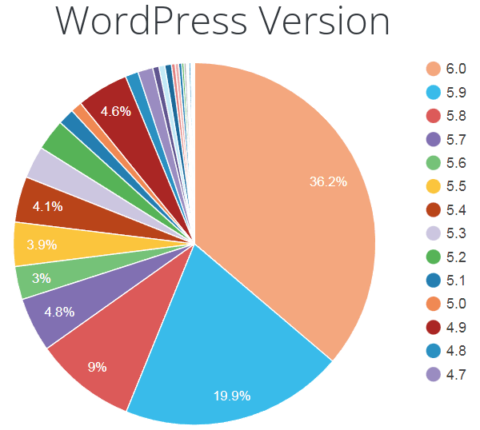WordPress 6.0 has been warmly received by many users and it appears that the feedback on 6.0 is one of a smooth rollout. There were a few reports of plugin conflicts but overall it seems opinions varied depending on which part of the WordPress community was responding.
Over 36% of All Sites Updated
According to WordPress documentation, 36.2% of all WordPress sites to date have updated within two weeks of the release of WordPress 6.0.
Nearly 20% of the user base is still holding on to version 5.9 of WordPress.
 Source: WordPress.org
Source: WordPress.orgWordPress 6.0 Arturo is a version change, which means that it is updating from from the 5.x development branch to the 6.x branch.
That might seem scary for some users because a version change of most things, like a new cell phone model, usually means radical changes.
But that’s not the case with WordPress 6.0.
As with previous version updates, version 6.0 represents an incremental update that could be said to be focused on making the experience of creating websites more intuitive and accessible.
Nevertheless a wariness of updating is bound to be felt by some users and not entirely without justification.
Advanced WordPress Users
In the Advanced WordPress Facebook group, a group consisting of members who are developers, the general tone of the discussion was mostly one of a pragmatic acceptance that Gutenberg isn’t ready yet, with some expressing that they’re going to wait a few more releases until Gutenberg is more robust and stable before adopting that platform for their clients.
In a 107 post discussion of WordPress 6.0, one member commented on the lack of sufficient documentation, which is a valid criticism.
Out of the over 100 posted comments, the sentiment about WordPress Arturo in this Facebook group is that it’s a good step forward, with acknowledgement of important progress in 6.0.
One member of the group praised the updates to the Block Tree and another said that the editor feels smoother overall.
This last observation about the smoothness of the editor is interesting because one of the goals for WordPress 6.0 was to make it more intuitive to use.
Advanced Users and WordPress 6.0
Matt Cromwell, an Admin of the Advanced WordPress Facebook group and WordPress entrepreneur, co-founder of GiveWP.com, shared his thoughts on the reception of WordPress 6.0.
He frames the reception around what WP 6.0 offers and how it was received:
“WordPress 6.0’s main goal was to enhance Full Site Editing to make it more available and attractive to WordPress implementers, meaning freelance developers, agencies, or internal web development teams.
Full Site Editing is the future of WordPress, but only if it gains traction.
The only way Full Site Editing gains real traction is if themes adopt it. Currently, this feature is only available to users if your theme declares support for it.
New features like style switching, page templates and integrated block patterns make Full Site Editing a lot more powerful for theme authors.
So ideally, this will help improve adoption in the long run.
Regarding the community reception, among the small businesses, freelancers and agencies that I interact with regularly, their response to Full Site Editing specifically is very similar to when Gutenberg was very first introduced. It’s too immature to build sites with currently.
Overall, people see the potential, but if you want to offer a feature to clients that empowers them to make dramatic site-wide changes, other tools like Elementor or Divi are already far more battle-tested and mature.
A really good example of this is the public discussion happening on the Gutenberg discussion board around making it more “agency friendly”.
Both the proposed improvements and the feedback is really enlightening for understanding how implementers are wrestling with adoption of all of what Gutenberg now offers.”
Reaction At Reddit
The reaction on Reddit was more opinionated than the conversations in the private Advanced WordPress Users Facebook group.
One member named sdenike posted that they were happy with the Gutenberg editor:
“I have been using Gutenberg for more than a year now as the only editor and have not experienced some of the issues/qualms that other people have had on their sites…”
But that comment was met with responses expressing a contrary experience, with one member observing that WordPress had gotten worse.
Why would someone say that a new version of WordPress core is worse than the previous version?
WP 6.0 was tested by many members of the WordPress community before release, so it’s not because WordPress shipped an inferior product.
Quite possibly, the perception of an update being worse is due to a conflict with an outdated plugin or theme.
Although 6.0 was made to be backward compatible, some conflicts with plugins and themes are almost inevitable.
So it may be useful to be sure that all plugins and themes are up to date before blaming the WordPress core.
Possible Plugin And Theme Conflicts
Redditor afr0flava posted about a strange bug that rendered a blank page for the edit screen.
“My “edit post” page is blank on Chrome since the update urrgh!”
Another Redditor, laserpoint, commented on how the justified alignment was different after updating.
“I just want Justified alignment for text and paragraph. Why was it removed?”
In another discussion a Redditor asked a question about decreased performance after updating to WordPress 6.0.
“Hi, I am using WordPress 6.0 and I am trying to investigate why my website is not performing very well. I enabled debug in wp-config.php, and I found something (missing PHP libraries).”
That user elaborated that the client site works fine except that it is performing slower and that they needed help with identifying what plugin was conflicting with the new version of WordPress.
Possible Bug In WordPress 6.0?
Another Redditor brought up an interesting (and apparently isolated) problem about content alignment.
The member, StinkyWeezle, commented:
“It’s great, but all my column containers are now vertically centered by default with a 2em gap between them.
They changed all the fallbacks if you don’t set a vertical alignment, but they still show as top aligned in the editor until you click each block.
Now have to upgrade lock 150 sites until I find a “not hacking the core” fix to change the fallbacks.”
Gutenberg Still Faces Holdouts To Classic Editor
As mentioned above, nearly 20% of WordPress users still have not transitioned from 5.9 to 6.0.
A recent thread on Reddit may partially explain why.
A Redditor named prankster999 expressed their preference for the classic editor over Gutenberg. They didn’t explain why other than the classic editor is what they are accustomed to.
“Am I the only one who likes the “Classic Editor” more than the “Block Editor”?
I understand that the “Block Editor” tries to make WordPress look and function more like Medium.
But the “Classic Editor” is more traditional in the line of websites like Reddit and forums (like Xenforo).”
Others, like rockycse21, agreed, noting that the classic editor was more “reliable.”
They didn’t explain what they meant by reliable but it could be construed as a comment about how the Classic Editor is a finished product that behaves in an expected manner while Gutenberg is not yet finished and because of its newness doesn’t offer the sense of familiarity offered by the Classic Editor.
So a sense of comfort in using what they already have may explain some of the reluctance to upgrade. Why fix what isn’t broken, right?
Redditor picard102 offered their opinion that many users actively dislike Gutenberg:
“You’re not alone. There are a lot of people who despise the Block Editor.”
That’s somewhat of an extreme but not uncommon opinion. There continues to be resistance to adopting Gutenberg.
Higgs-B observed that the Gutenberg editor is not yet fully ready, which is true.
“Unfortunately the block/Gutenberg editor has not yet matured enough for non coders.”
WordPress 6.0
The most important thing to remember about the newest version of WordPress is that it is an incremental update and not a radical update. Also, it is designed to be backward compatible. That means that it will still work with server environments that are using PHP versions less than 7.4 (down to PHP 5.6), although 7.4 is the minimum version recommended.
Something important to consider is that WordPress 6.0, like 5.9 before it, currently only offers beta support for PHP 8.0.
It’s possible that users who have updated to PHP version 8.0 may experience incompatibility issues.
Prior to updating it may be prudent to back up the entire WordPress site and database so that if anything goes wrong the website can be restored to a previous state.
Knowing all of these things beforehand may save having to experience some of the bugs and weirdness that a few users are reporting.
Overall, the reaction from the WordPress community to WordPress 6.0 is that it was a smooth update.
